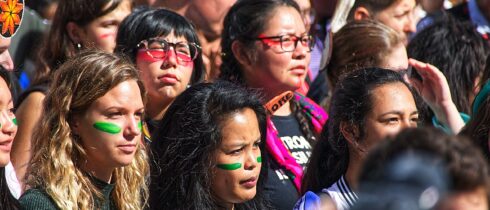

UNESCO Master Class: Colonial Continuities and Climate Activism
On November 1, the Office for Equal Opportunities at the City of Heidelberg together with the European Coalition of Cities against Racism hosted the UNESCO Master Class: Colonial Continuities and Climate Activism in Heidelberg.
The Master Class “Reflecting the Privilege of white Climate Activism” on November 1, hosted more than 100 participants from all over Germany and abroad. Climate activists, scientists and artists, highlighted the role of intersectionality as a key component of climate justice activism and showed the relationships between colonial exploitation, its modern continuation and climate change and activism, which structure the climate movement.
Throughout the day, the participants were invited to take different perspectives on climate activism, reflect their own racial perceptions and engage with colonial thought patterns.
After opening the conference with musical and poetic contributions by Celina Bostic and Shofie Bahlawan, activists and scientists, addressed racism within their movement and demanded a reflection of the structures and aims of climate organizations. Kenyan activist, Anita Soina, asked: “If we are discriminating ourselves, yet we have a common goal– will we achieve the common goal? Will we win the war against climate change?” This was picked up by degrowth scientist and activist Tonny Nowshin, who demanded that “ this movement has to change, if we say that this is the fight of our time”. Shayli Kartal, explained ways in which BIPoC perspectives are erased and demanded support and safer spaces for BIPoC within their organizations. In the end of the first session Leonie Baumgarten-Egemole und Line Niedeggen gave examples how intersectional could be realized in practice and stressed that “BIPoC in the climate justice movement have to network and connect, to empower themselves”.
The following workshop sessions “Reflecting own privileges and narratives” and “Inclusive organizational strategies”, facillitated by the Antirassismus vor Acht lecturers Se McCarthy, Aaron Müller, with the suport of Evein Obulor, addressed racial discrimination on different societal dimensions and subsequent barriers to participation in German climate movements. The participants engaged with their own thought patterns and reflected their positioning within global power relations. In small groups the participants of the workshop discussed strategies to actively confront racism and reduce barriers to participation and representation in their movements.
To finish the Master Class, a panel of climate activists of different organizations in Germany discussed strategies for an inclusive climate movement. Moderated by Ali Can, Imeh Ituen (Black Earth), Dante Davis (Locals United), Asuka Kähler (Fridays for Future Frankfurt) and Jane (Extinction Rebellion Heidelberg) shared their experiences in climate organizations with each other and the participants. The debate addressed white and european centered understandings of climate activism and the erasure of BIPoC perspectives within the movement. Imeh Ituen stressed that “we can’t get stuck in a debate of BIPoC representation, because the demands and contents of climate organizations also need to be decolonized”. Jane highlighted the importance of a thorough and shared understanding of colonialism and authentic use of the concept climate justice. She appealed to the participants to “get educated about decolonization”.
In the light of rising Covid19 cases across Europe and in Heidelberg, the City Walk “Colonial Traces and Continuities in the City”, on October 31, had to be postponed.
Download the Program UNESCO Master Class, November 1
Image © ECCAR














